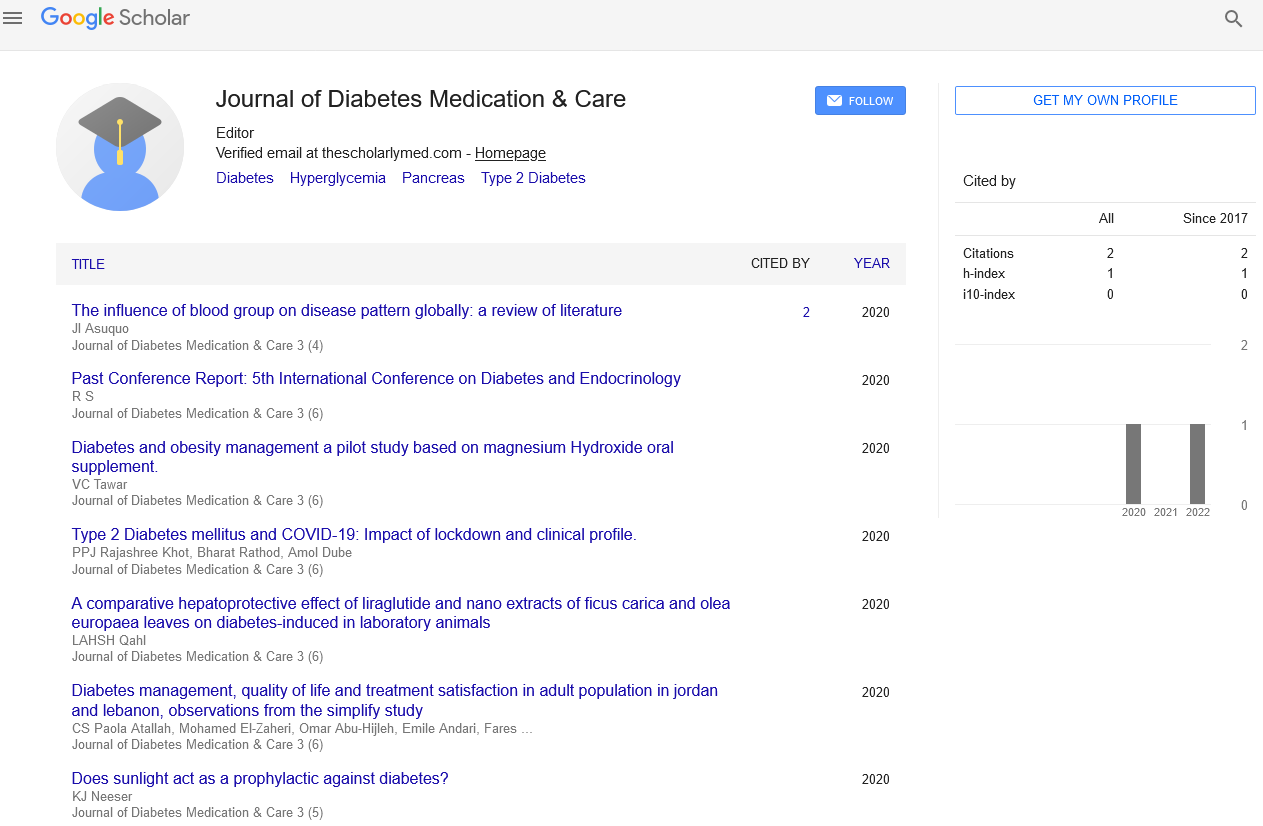Opinion Article - Journal of Diabetes Medication & Care (2024) Volume 7, Issue 4
Discovering the Role of New Genes in Diabetes
- Corresponding Author:
- Shaase Ahmad
Department of Genetics, University of Copenhagen, Copenhagen, Denmark
E-mail: Shaseahmad@nhs.net
Received: 15-Jul-2024, Manuscript No. JDMC-24-142064; Editor assigned: 17-Jul-2024, PreQC No. JDMC-24-142064 (PQ); Reviewed: 31-Jul-2024, QC No. JDMC-24-142064; Revised: 07-Aug-2024, Manuscript No. JDMC-24-142064 (R); Published: 14-Aug-2024, DOI: 10.37532/JDMC.2024.7(4).246-247
Introduction
Diabetes mellitus, a chronic metabolic disorder characterized by elevated blood sugar levels, affects millions worldwide and poses a significant challenge to public health. While both genetic and environmental factors contribute to its development, recent advancements in genomic research have shed light on the role of novel genes in predisposing individuals to diabetes. This article delves into the fascinating realm of genetic discoveries, exploring how these insights are reshaping our understanding of diabetes and paving the way for more targeted treatments.
Description
Unveiling the genetic landscape
Historically, diabetes was primarily understood as a disease of insulin resistance or insufficient insulin production by the pancreas. However, the advent of Genome-Wide Association Studies (GWAS) has revolutionized this perception. GWAS involves scanning the entire genome of thousands of individuals to identify genetic variations associated with a particular disease or trait. In the case of diabetes, these studies have uncovered a multitude of genetic loci linked to both type 1 and type 2 diabetes.
One of the pivotal discoveries from GWAS is the identification of new genes implicated in diabetes susceptibility. These genes may influence various aspects of glucose metabolism, insulin secretion, or insulin action in the body. For instance, variants in the TCF7L2 gene have been strongly associated with an increased risk of type 2 diabetes, highlighting its critical role in regulating insulin secretion from pancreatic beta cells.
The role of novel genes
Beyond well-established genes like TCF7L2, researchers continue to unearth new genetic players in diabetes. These discoveries are crucial as they provide fresh insights into the underlying mechanisms of the disease. For example, a recent study published in a leading genetics journal revealed the involvement of a previously unknown gene cluster in beta cell function. This finding not only deepens our understanding of diabetes pathophysiology but also opens avenues for developing novel therapeutic strategies targeting these specific genetic pathways.
Moreover, the advent of high-throughput sequencing technologies has accelerated the discovery of rare genetic variants that confer a high risk of diabetes in certain populations. These rare variants, though individually uncommon, collectively contribute to a significant proportion of diabetes cases. By pinpointing these variants and elucidating their functional consequences, researchers can better tailor preventive measures and treatments to individuals with a heightened genetic predisposition.
From genes to mechanisms
Understanding how newly identified genes contribute to diabetes involves deciphering their molecular mechanisms. This process often entails comprehensive laboratory experiments, including cellular and animal models, to dissect the precise role of these genes in glucose homeostasis. Through these studies, researchers can elucidate whether a gene variant alters insulin sensitivity, impairs beta cell function, or disrupts other metabolic pathways critical to diabetes pathogenesis.
For example, a recent breakthrough in molecular biology uncovered a gene variant that interferes with insulin receptor signalling in adipose tissue, exacerbating insulin resistance-a hallmark of type 2 diabetes. Such mechanistic insights not only validate the genetic association observed in GWAS but also provide a rationale for developing targeted therapies aimed at restoring normal insulin signalling pathways.
Implications for personalized medicine
The elucidation of new genes in diabetes not only enhances our understanding of disease mechanisms but also holds profound implications for personalized medicine. By leveraging genetic information, clinicians can stratify individuals based on their genetic risk profiles, enabling early intervention and personalized treatment strategies. For instance, individuals identified with high risk genetic variants may benefit from lifestyle modifications, intensive glucose monitoring, or specific pharmacological interventions tailored to their genetic predisposition.
Furthermore, ongoing research in pharmacogenomics the study of how genetic variations influence responses to drugs-promises to optimize diabetes management further. By identifying genetic markers that predict an individual’s response to specific anti-diabetic medications, clinicians can prescribe the most effective treatment with minimal adverse effects, thereby improving therapeutic outcomes and patient adherence.
Challenges and future directions
Despite the promising strides in genetic research, several challenges remain on the path to fully harnessing the potential of genetic discoveries in diabetes. One major hurdle is the complexity of gene-environment interactions, where environmental factors such as diet, physical activity, and stress interact with genetic predispositions to influence disease onset and progression. Untangling these intricate interactions requires interdisciplinary collaborations and large scale longitudinal studies that capture both genetic and environmental data over time.
Moreover, translating genetic findings into clinical practice necessitates robust validation studies across diverse populations to ensure the generalizability and reliability of genetic risk predictors. Given the genetic diversity across different ethnic groups, it is crucial to include diverse populations in genetic research to capture the full spectrum of genetic variability and its implications for diabetes susceptibility.
Looking ahead, advancements in bioinformatics, computational biology, and artificial intelligence are poised to accelerate the pace of genetic discovery in diabetes. These technologies enable researchers to analyze vast datasets, integrate multi-omics data (genomics, transcriptomics, proteomics), and identify novel gene-gene or gene-environment interactions that underpin diabetes etiology.
Conclusion
In conclusion, the discovery of new genes implicated in diabetes represents a transformative era in biomedical research. From unravelling the genetic architecture of diabetes to elucidating disease mechanisms and informing personalized treatment strategies, these insights are reshaping our approach to diabetes management and care. As researchers continue to uncover the genetic underpinnings of diabetes, the prospect of more precise diagnostics, targeted therapies, and preventive interventions becomes increasingly tangible. By embracing the interdisciplinary synergy of genetics, molecular biology, and clinical medicine, we stand poised to translate genetic discoveries into tangible benefits for individuals affected by diabetes worldwide.

